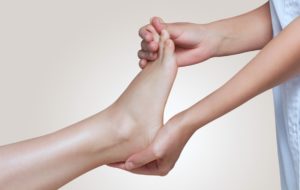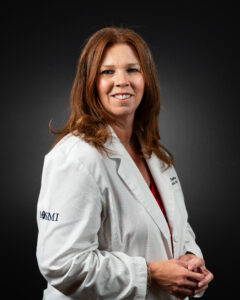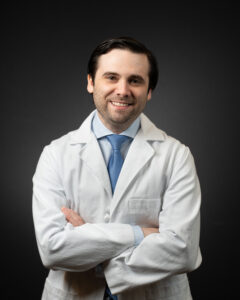Podiatry Wound Care Treatment Provided by Orthopedic Specialists in Freehold, NJ
Reviewed by AOSMI’s Podiatric Surgeon, Dr. Wesley Nesbit
 In recent years, the science of wound care has advanced significantly. Once believed to be helpful, the approach of simply “letting the air get to it” is now known to actually impede healing. Instead, researchers have confirmed that foot wounds heal faster, with a lower risk of infection, when kept moist and covered.
In recent years, the science of wound care has advanced significantly. Once believed to be helpful, the approach of simply “letting the air get to it” is now known to actually impede healing. Instead, researchers have confirmed that foot wounds heal faster, with a lower risk of infection, when kept moist and covered.
With diabetes steadily on the rise, professional podiatrists and wound care specialists are now more important than ever. The podiatrists at the Advanced Orthopedics and Sports Medicine Institute provide specialized lower extremity wound care at our office locations in Freehold and Monroe Township, NJ.
Why is specialized diabetic foot care so important?
Diabetes can slow blood circulation, which in turn can interfere with the body’s natural healing processes. Until a wound is completely healed, it remains susceptible to infection. This means that diabetics have a heightened risk of developing foot conditions, such as diabetic foot ulcerations and Charcot’s foot. Even a relatively simple wound, such as a blister caused by wearing tight shoes, can progress into a potentially serious issue if it is not properly cared for by a podiatry wound specialist.
How the podiatrists and wound care specialists at AOSMI can help
If you have a foot wound that doesn’t seem to be healing properly, it is essential to seek prompt medical attention from a podiatrist or foot wound care specialist – especially if you are a diabetic. Professional podiatry and wound care services can help prevent infection and other complications such as:
- Infection: Untreated foot wounds, especially in diabetic patients, are highly susceptible to infections. These infections can quickly spread, leading to cellulitis or abscess formation. In severe cases, they may even result in systemic infections, requiring hospitalization and aggressive treatment. Seeking timely care from our podiatrists is crucial to prevent these potentially life-threatening complications.
- Gangrene: Prolonged neglect of foot wounds can lead to the development of gangrene, a condition where the tissue dies due to a lack of blood supply. This is a serious and irreversible complication that often necessitates surgical intervention, including amputation. Regular monitoring and treatment by our specialized team can help prevent the progression of wounds to this critical stage.
- Chronic Ulceration: Chronic non-healing wounds can lead to ulcerations that are painful and debilitating. These ulcers may persist for an extended period, causing discomfort and significantly impacting one’s quality of life. Our podiatrists employ advanced techniques and therapies to promote wound healing and prevent the onset of chronic ulcerations.
The team of expert podiatrists at AOSMI can perform a comprehensive orthopedic, neurologic, and vascular examination to then recommend an orthopedic podiatry strategy to promote healing. For instance, our wound and podiatry care specialists may suggest:
- Removing dead, damaged, or infected tissue (debriding) to improve the healing potential of the remaining healthy tissue
- Applying topical medications and dressing to reduce the risk of infection
- Off-loading with a brace, cast, crutches, wheelchair, or special footwear, which can reduce pressure on the wound
- Managing blood glucose levels to promote blood circulation
After your foot wound has fully healed, our orthopedic podiatrists will continue to monitor your progress through periodic checkups. They will also recommend an appropriate preventive strategy to help you avoid future problems with your foot wound.
Contact the podiatry wound care specialists at AOSMI
If you’d like to learn more about our podiatry and wound care services, contact AOSMI today and schedule an appointment with one of our board-certified orthopedic podiatrists. We have two offices conveniently located near you in Freehold, and Monroe Township, New Jersey.
Frequently Asked Questions About Podiatry Wound Care
What is the fastest way to heal a foot wound?
The speed of healing a foot wound depends on various factors, including the wound’s type and size, your overall health, and the care it receives. Our specialized podiatrists at AOSMI can assess your condition and recommend tailored treatment options to expedite the healing process.
How do you treat a foot wound that won’t heal?
Non-healing foot wounds require professional attention. Our experienced team at AOSMI offers a range of advanced wound care therapies, including wound dressings, debridement, and specialized wound care products, to promote healing and prevent complications.
Can a diabetic foot wound be treated without surgery?
In many cases, diabetic foot wounds can be successfully treated without surgery. Our podiatrists employ various conservative treatments such as offloading devices, wound dressings, and infection management to help heal diabetic foot wounds. Surgery is only considered when non-surgical methods prove ineffective or in cases of severe infection or tissue damage.
Should I see a podiatrist for my foot wound?
If you have a foot wound that is slow to heal, exhibits signs of infection, or causes persistent pain, it’s essential to consult a podiatrist promptly. Early intervention can prevent complications and expedite the healing process. Contact AOSMI to schedule an appointment with our experienced podiatrists.
How do I find a podiatry wound care doctor near me?
To find a qualified podiatry wound care doctor near you, reach out to AOSMI. We have convenient office locations in Freehold and Monroe Township, NJ, staffed with experienced podiatrists and wound care specialists. Contact us, and our friendly team will assist you in scheduling an appointment with our experts for your foot wound care needs. Your foot health is our priority.
Find your Provider









